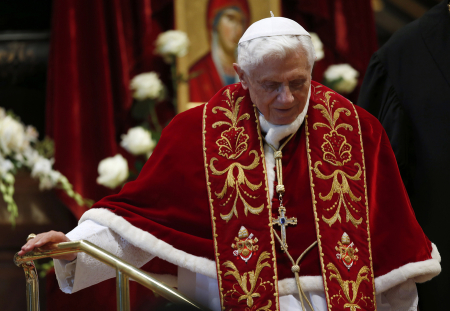Pope Benedict Defrocked Almost 400 Priests in 2 Years; New Documents Make Astonishing Revelation

Documents released by the Associated Press suggest that from 2011 to 2012 Pope Benedict worked to defrock nearly 400 priests on claims that the men molested children - news that comes in the aftermath of the U.N.'s harsh critique of the Catholic Church's handling of the global sex abuse scandal on Thursday.
The reports also demonstrate a shift in the Church's approach towards handling sex abuse cases, which historically were dealt with by switching the parish where the priest served, rather than involving local law enforcement or Vatican tribunals.
But in 2001, former Pope Benedict, then a cardinal, mandated that accused priests be put on trial in church tribunals, with a maximum penalty of being defrocked.
In 2005, the Vatican began reporting numbers of defrocked priests and authorized Church trials against 21 accused clerics. Since 2005, the numbers began to increase to between 300-400 cases a year in 2007 and 2008.
In 2010, following a wave of media coverage of sex abuse scandals in Europe, 527 cases were reported, though the Vatican did not report how many priests had been defrocked. In 2011 and 2012, however, 260 and 124 priests were defrocked respectively.
The report, prepared by the Vatican, was put together as part of its testimony to the U.N. committee on Thursday, reported the Associated Press and was released a day after the group harshly critiqued the Catholic Church's handling of the global sex abuse scandal.
Earlier this week, the Vatican appeared before a U.N. committee that confronted the Church on why it had failed to abide by the U.N. Convention on the Rights of the Child, which directs its signatories to protect their children from harm. According to its critics and activists, however, the Catholic Church perpetuated a culture of child abuse by failing to comprehensively crackdown on problem cases.
Although the church ratified the U.N. convention in 1990, it submitted just two implementation reports in 22 years, the most recent coming in 2012.
Sara Oviedo, the committee's main human rights investigator, challenged the Vatican on why offending priests had been transferred to other dioceses, rather than having their crimes reported to authorities.
What was behind the church's "efforts to cover up and obscure these types of cases?" she asked.
The Vatican attempted to explain its inaction by claiming it had limited personal control over the Church's more than 400,000 priests worldwide, explaining that criminal cases were a job for local law enforcement.
"Priests are not functionaries of the Vatican. Priests are citizens of their own states, and they fall under the jurisdiction of their own country," Archbishop Silvano Tomasi, the Vatican's U.N. ambassador in Geneva, told the committee.
Monsignor Charles Scicluna, the Vatican's former sex crimes prosecutor, said that he believes the Church now "gets it" and realizes that "there are certain things that need to be done differently."
The U.N. committee was composed of victim groups, human rights organizations and the U.N. partnering together to confront the Church on its abuse record, based on reports from victims and evidence detailing the sex abuse scandal's global scope. Among the countries of the parishes that had been affected were Ireland, Mexico, Britain, the U.S., Canada, the Dominican Republic and Australia.





















